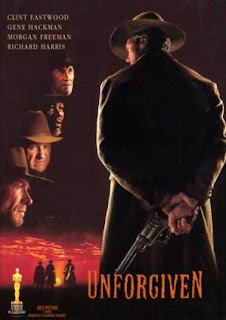I'm sure we'll be talking about Oscars 2k17 for a very, very long time. Poor Warren Beatty just looks at the camera like plz help me when given the wrong envelope & La La Land was announced instead of the rightful winner Moonlight. It's one of the most devastating, embarrassing and awkward moments on live tv that I've about ever seen. I had very strong opinions on both movies: I thought Moonlight was nothing special and I thought La La Land was very special. I appear to be in the minority on this, but you can fight me: I still think La La Land should have won. I don't think that Moonlight is an awful movie, I just think that there are more flaws than I'd consider for a best picture winner.
As I thought over how sad I was that the movie I wanted lost, I thought of ten other movies I wish had won in other years.
1994
What was nominated: Forrest Gump, Four Weddings and a Funeral, Pulp Fiction, Quiz Show, Shawshank Redemption
What won: Forrest Gump
What should have won: Shawshank Redemption
I cannot describe how strongly I feel about this. I have never been a huge fan of Forrest Gump (despite how much I like Tom Hanks) and this one tops the overrated charts for me especially when it's paired against Shawshank Redemption and Pulp Fiction - two of the greatest films ever. I would still choose Shawshank as the number one slot for its incredible story.
1989
What was nominated: Born on the Fourth of July, Dead Poets Society, Driving Miss Daisy, Field of Dreams, My Left Foot
What won: Driving Miss Daisy
What should have won: Dead Poets Society
I'm going to pull the shelf life card on this one: Driving Miss Daisy was basically forgotten the second the awards were over. Dead Poets Society is deep, emotional, and inspirational. It will be a long time more before we are forgetting Robin Williams' "seize the day" attitude that changed us all.
1998
What was nominated: Elizabeth, Life is Beautiful, Saving Private Ryan, Shakespeare in Love, The Thin Red Line
What won: Shakespeare In Love
What should have won: Saving Private Ryan
I also feel very strongly about how much I hate Shakespeare in Love. It's just so lame. Saving Private Ryan may be the best war movie ever made and ain't nobody watching that without crying.
1982
What was nominated: E.T.: The Extra Terrestrial, Gandhi, Missing, Tootsie, The Verdict
What won: Gandhi
What should have won: E.T.
Have you seen Gandhi? Did you stay awake? It's a long, long drawn-out historical epic that has a very short shelf life after the Oscars. Of the movies nominated, I would have chosen literally any of the other movies but E.T. is and always will be my very favorite Spielberg.
2005
What was nominated: Brokeback Mountain, Capote, Crash, Good Night and Good Luck, Munich
What won: Crash
What should have won: Brokeback Mountain
I feel like after Crash won people started to scrutinize the Academy a lot more because really, Crash is a solidly mediocre movie that pretty much no one cares about. There may have been a bunch of stars in it and its racially driven plot is sort of memorable but Brokeback Mountain was incredible on so many levels. Ang Lee's beautiful direction, a sweeping love story, and the unforgettable "I wish I knew how to quit you."
1995
What was nominated: Apollo 13, Babe, Braveheart, Il Postino, Sense and Sensibility
What won: Braveheart
What should have won: Apollo 13
Apollo 13 is a smart movie about a dramatic event in US History. It's an incredible story with excellent acting and writing. Braveheart is just really overrated.
2014
What was nominated: American Sniper, Birdman, Boyhood, The Grand Budapest Hotel, The Imitation Game, Selma, The Theory of Everything, Whiplash
What won: Birdman
What should have won: Boyhood
Twelve years. TWELVE. That's how much time and effort went into this perfectly realistic coming of age story. If nothing else, his hard work deserved a nomination but the finished product also equals the time spent. I've never been a huge fan of Birdman for no real reason. It's a good movie. Boyhood was just better.
2011
What was nominated: The Artist, The Descendants, Extremely Loud & Incredibly Close, The Help, Hugo, Midnight in Paris, Moneyball, The Tree of Life, Warhorse
What won: The Artist
What should have won: Midnight in Paris
I'm not as bitter about its Best Picture win as I am that Jean Dujardin won over George Clooney. But when all is said and done, I would watch Midnight in Paris 100 times over the Artist's single viewing.
1952
What was nominated: The Greatest Show on Earth, High Noon, Ivanhoe, Moulin Rouge, The Quiet Man
What won: The Greatest Show on Earth
What should have won: Singin' in the Rain
How sad is it that Singing in the Rain wasn't even nominated?
1996
What was nominated: The English Patient, Fargo, Jerry Maguire, Secrets & Lies, Shine
What won: The English Patient
What should have won: Fargo
The English Patient is a good movie. Fargo is a better, more memorable movie with perfect performances from Francis McDormand and William H. Macy.
Honorable Mentions:
Citizen Kane (1941)
Psycho (1960)
The Graduate (1967)
Broadcast News (1987)
Raiders of the Lost Ark (1981)
Goodfellas (1990)
The Social Network (2010)
































